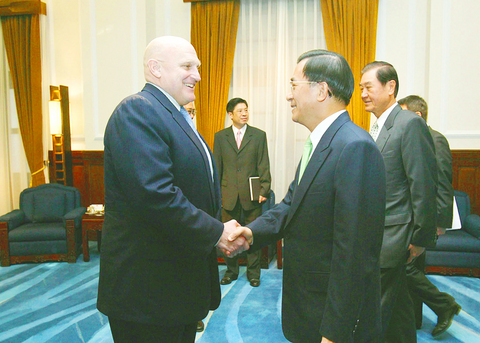A senior US official has refused to say whether President Chen Shui-bian (
Assistant Secretary of State for East Asia Christopher Hill, when asked by reporters after an appearance before a congressional committee hearing, would not say whether Taiwan had responded to a State Department demand last Thursday for assurances that Chen's actions were not intended to change the cross-strait "status quo."
Demands

PHOTO: CNA
The department's demands were contained in a hastily issued statement in which it both expressed its conviction that Chen did not intend to change the status quo, and also asked him once again to assure Washington that that was his real intent.
The latter request followed what turned out to be erroneous reports that DPP officials said Chen had abolished the council and guidelines, rather than just mothballing them.
State Department spokesmen have mentioned Chen's actions and the cross-strait dialogue issue several times in the same breath over the past two weeks, but this was the clearest indication yet that the Washington feels that direct dialogue is the only answer to the actions by both sides that have rattled cross-strait relations in recent years.
"I don't want to characterize our view on assurances [from Chen]," Hill told reporters.
"What I want to emphasize is that we believe this is an issue that needs to be resolved through dialogue, and that both sides need to show restraint," he said.
In a reference to the so-called "Anti-Secession" Law that Beijing's National People's Congress approved last March, Hill said that "there is no role for any mention of non-peaceful means," the phrase the law used as a threat to invade Taiwan if it moves toward formal independence.
Hill called on both sides to "approach this not unilaterally but in a mutual effort at dialogue," adding "There is no room here for unilateral announcements or any threats of the use of force of any kind."
In his written testimony before the subcommittee, Hill called on Beijing to "engage in meaningful dialogue with Taiwan's democratically elected leaders in the near future."
It was not clear what he meant by the "near future," or whether he has any information that Beijing is willing to engage in talks any time soon.
Nor was there any indication that the administration of US President George W. Bush has been making any special effort to press Beijing into opening talks with Chen.
Hill told a reporter that he had "no new information" about whether China was willing to open talks with Chen's government, at least on the basis demanded by Taiwan and Washington, that is, without any conditions that they be based on the so-called "one China" principle.
Confidence
Meanwhile, Taiwan's de-facto ambassador to the US, David Lee (
He said he was "very surprised" by the State Department's statement last Thursday calling on Chen to explain his actions and assure Washington he does not intend to change the status quo.
While saying that differences remain between Washington and Taipei on the issue, Lee added that "in the past few days we have been trying to bridge the differences. I'm confident that we will sort out the issue in the near future," certainly well before Chinese President Hu Jintao (
"I don't think we have a deep gap between us," Lee told the Taipei Times. "I think both sides need to be more considerate with each other."

Taiwan is to commence mass production of the Tien Kung (天弓, “Sky Bow”) III, IV and V missiles by the second quarter of this year if the legislature approves the government’s NT$1.25 trillion (US$39.78 billion) special defense budget, an official said yesterday. Commenting on condition of anonymity, a defense official with knowledge of the matter said that the advanced systems are expected to provide crucial capabilities against ballistic and cruise missiles for the proposed “T-Dome,” an advanced, multi-layered air defense network. The Tien Kung III is an air defense missile with a maximum interception altitude of 35km. The Tien Kung IV and V

The disruption of 941 flights in and out of Taiwan due to China’s large-scale military exercises was no accident, but rather the result of a “quasi-blockade” used to simulate creating the air and sea routes needed for an amphibious landing, a military expert said. The disruptions occurred on Tuesday and lasted about 10 hours as China conducted live-fire drills in the Taiwan Strait. The Civil Aviation Administration (CAA) said the exercises affected 857 international flights and 84 domestic flights, affecting more than 100,000 travelers. Su Tzu-yun (蘇紫雲), a research fellow at the government-sponsored Institute for National Defense and Security Research, said the air

A strong continental cold air mass is to bring pollutants to Taiwan from tomorrow, the Ministry of Environment said today, as it issued an “orange” air quality alert for most of the country. All of Taiwan except for Hualien and Taitung counties is to be under an “orange” air quality alert tomorrow, indicating air quality that is unhealthy for sensitive groups. In China, areas from Shandong to Shanghai have been enveloped in haze since Saturday, the ministry said in a news release. Yesterday, hourly concentrations of PM2.5 in these areas ranged from 65 to 160 micrograms per cubic meter (mg/m³), and pollutants were

Taiwan’s armed forces have established response protocols for a wide range of sudden contingencies, including the “Wan Chun Plan” to protect the head of state, the Ministry of Defense (MND) said today. After US President Donald Trump on Saturday launched a series of airstrikes in Venezuela and kidnapped Venezuelan President Nicolas Maduro, concerns have been raised as to whether China would launch a similar “decapitation strike” on Taiwan. The armed forces regularly coordinate with relevant agencies and practice drills to ensure preparedness for a wide range of scenarios, Vice Minister of National Defense Hsu Szu-chien (徐斯儉) told reporters before a